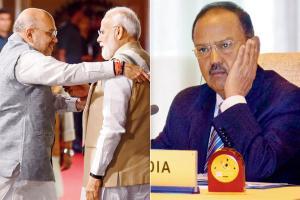With Amit Shah at home ministry, S Jaishankar at external affairs, and Rajnath Singh at defence u00e2u0080u0093 can NSA and home minister avoid a turf war?

(Left) Newly-appointed Home Minister Amit Shah with Prime Minister Narendra Modi; National Security Advisor Ajit Doval. Pics/AFP
![]() It's no surprise that Prime Minister Narendra Modi appointed party chief and long-time associate Amit Shah as our Home Minister
It's no surprise that Prime Minister Narendra Modi appointed party chief and long-time associate Amit Shah as our Home Minister
Some commentators have likened it to when, over two decades ago, then PM A B Vajpayee selected party boss and close associate L K Advani as home minister. (It's an irony of history that a few months after the 2002 Gujarat violence, when Advani had to dissuade Vajpayee from asking chief minister Modi for his resignation, Vajpayee promoted Advani to deputy PM.) The parallel isn't entirely correct, though some consequences might turn out similar.
ADVERTISEMENT
Advani was beloved by the BJP rank and file. Many believed he ought not to have proposed Vajpayee's name as PM candidate back in 1996, and ought have been a PM candidate himself. The current BJP obviously wants only Modi as PM for long into the foreseeable future. Also, though Shah is an uninspiring orator — just watch his election speeches — he fancies himself as Modi's eventual successor. Trouble is, the rank and file will never be as enthusiastic about Shah as they once were about Advani (who squandered that goodwill in 2005 on a visit to Pakistan where he paid tribute to Mohammed Ali Jinnah.)
Vajpayee and Advani occasionally did not see eye-to-eye, impacting policy-making and decision-taking. One example was the 2001 Agra summit between Vajpayee and newly-designated Pakistani president Pervez Musharraf. The two almost reached a landmark agreement but it didn't happen thanks to Advani, much to the lasting chagrin of Vajpayee's National Security Advisor (NSA) Brajesh Mishra. Another example was the hijacking of Indian Airlines flight IC-814, in which the 176 passengers were taken hostage and the plane landed at Kandahar, Afghanistan. The hijackers demanded the release of terrorists in Indian jails, one of which was Masood Azhar, recently proscribed by the UN. Advani was not in favour, and so when the Crisis Management Group decided on releasing the terrorists, he absented himself from Delhi. It is safe to assume Shah will never oppose any Modi policy position.
There was also the rivalry between Advani and Mishra. The NSA, who was also Vajpayee's principal secretary, was his PM's alter-ego. They were comfortable in each other's presence; they were on the same wavelength, and for practical purposes, Mishra ran the government for Vajpayee. Mishra also, in a ground-breaking manner, established the NSA post.
In comparison, Vajpayee's successor, Dr Manmohan Singh, was less fortunate. His principal secretary, T K A Nair, was not his first choice and proved ineffectual. There were high hopes from his first NSA, J N Dixit, who unfortunately passed away seven months later. Dr Singh's subsequent NSAs were not of Mishra's calibre. Ajit Doval exerted much influence during Modi's first term, and was often called the second-most powerful man in government. That appellation has already passed to Shah in Modi's second term.
During the Vajpayee era, it was an open secret that Mishra and Advani didn't see eye-to-eye. Mishra was Vajpayee's trouble-shooter whereas Advani had limited skills as a political administrator; he was more of a super-bureaucrat. They struggled over turf, particularly when it came to matters like the intelligence agencies. The Intelligence Bureau (IB) for instance, is administratively under the home minister but has historically reported directly to the PM. Since Mishra's time, the IB director has reported to the NSA though he regularly briefs the PM.
The tug-of-war between Mishra and Advani caused much stress for the intelligence chiefs. Disclosure: your columnist co-wrote two books with A S Dulat, an old IB hand who was selected by Vajpayee to head the external intelligence agency, Research and Analysis Wing, and who then served in the PMO as an advisor on Kashmir. Dulat was, on one occasion, asked by the then IB number two, who was close to Advani, to pay a courtesy call to the home minister. Dulat declined, on the ground that it would not make his boss, Mishra, happy. Incidentally, that IB officer was Doval.
Given Shah's background as a tough home minister in Gujarat, his appetite for information and intelligence, and his penchant for off-the-books operations, it seems unlikely he will permit anyone other than himself to manage the intelligence agencies. That can't bode well for Doval, a former IB chief, who from all accounts has been an intelligence czar the past five years.
Doval's future is unclear. Before the election results that stunned everyone, he told confidants he wished to retire; in any case he will be 75 in January, the cut-off age set by Modi. He continues as NSA till the PM decides otherwise.
But with Shah at the home ministry, S Jaishankar, a seasoned and proven strategist, at external affairs, and BJP stalwart Rajnath Singh at defence — can the NSA and home minister avoid a turf war? If not, it would be a case of déjà vu.
Aditya Sinha's latest book, India Unmade: How the Modi Government Broke the Economy, with Yashwant Sinha, is out now. He tweets @autumnshade Send your feedback to mailbag@mid-day.com
Catch up on all the latest Crime, National, International and Hatke news here. Also download the new mid-day Android and iOS apps to get latest updates
 Subscribe today by clicking the link and stay updated with the latest news!" Click here!
Subscribe today by clicking the link and stay updated with the latest news!" Click here!







